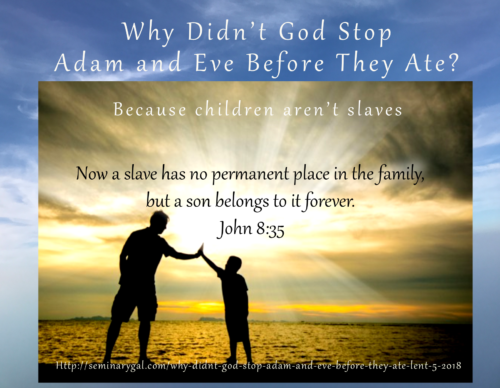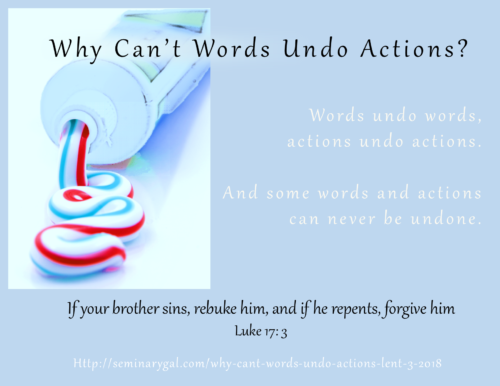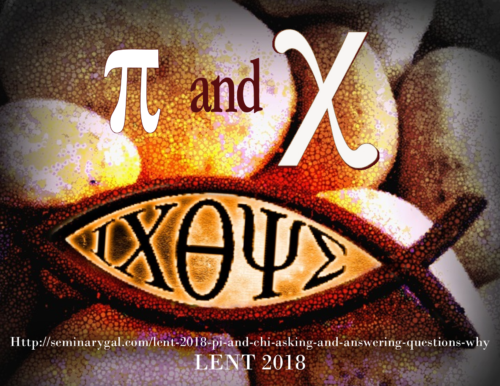As we continue our Lent 2018 devotional series Pi and Chi looking at questions “Why?” and how they are all answered in Jesus Christ the Son of God, we’ll explore a subject Jesus spoke about a lot: Hell. If Jesus could talk about Hell often, I ask your indulgence for one more day because eternal destination is really, really important.
Why is There Hell? Especially if God is so loving, as the Catholic priest in the movie keeps saying, why would God even invent a place like that?
First, we must acknowledge there are some Christian scholars who deny the existence of Hell as a place of eternal torment. These “annihilationists” believe the unsaved become nothing after the final judgment. Advocates for that position include John Stott, Clark Pinnock, and John G. Stackhouse, Jr. They have theological reasons for believing it.
Others admit they don’t know: F.F. Bruce and N.T. Wright are among the “agnostics.”
Critics of this annihilationist view include Wayne Grudem, J.I. Packer, R.C. Sproul, Tim Keller, Franklin Graham, Rick Warren, John F. MacArthur, and they argue that Hell is very real.
Perhaps those names are meaningless to you. You may recognize some as authors and pastors you admire.
My point is this: we can disagree on some things in the world of Christianity and happily remain brothers and sisters in Christ. I own books from individuals in all those camps.
In case you’re curious, my view is that Heaven is just as real as Hell—Jesus spoke of both. Hell is an uncomfortable subject. Therefore, I think there are plenty of Christians who diminish Hell because it’s uncomfortable, embarrassing, and hard to explain. They choose to believe that God will find another way since God is Love (1 John 4:16). He’s a loving God.
My view is predicated upon the assumption that Hell is not a “place” like Dubuque or Dubai or Dublin. You can’t set your GPS for it as a physical location. Think of “Hell” as “Not Heaven”. The Bible says of Heaven, “Nothing impure will ever enter it, nor will anyone who does what is shameful or deceitful, but only those whose names are written in the Lamb’s book of life.” (Revelation 21:27).

Just as there was the Garden of Eden (holy) and a location outside of Eden (unholy), there is the presence of Holy God in His fullness (that’s called Heaven), but there’s a place away from God, too. For those who hated God, rebelled against Him and every opportunity to be reconciled to their Creator, they are outside of God’s presence forever. No second chances for the unholy after death. No third or fourth chances after ripening in purgatory. Just as God didn’t let Adam and Eve back into His presence in the Garden, there will be no coming back into God’s presence and it will feel like Hell.
Hell is essentially one’s choice to reject God… carved in stone. Having nothing to do with God is Hell.
And that’s why I believe you can be present with God (with Christ’s forgiveness applied to you by faith even today) … or you can reject/be without Him (it’s a daily choice). But when it’s Game Over, there are no shades of faith just like there are no degrees of pregnant. You either are or you’re not. There are no fence-sitters in God’s world. You’re either 100% in Heaven as a person made 100% holy or it’s 100% Hell of one’s unholy choosing day-by-day, fixed eternally.
Food for thought:
- To have 2 destinations doesn’t diminish God’s being Love. He provided the way, the truth, and the life…in Christ (John 14:6)…fulfilling John 3:16-17 and saving us from Hell. Are two destinations incompatible with a God of love?
- In what ways did God respect both our Image-bearing and freedom of choice?
- What do you think about Hell?
Join me tomorrow for Why Did He Create Us at All?
===
For Lent 2018, we’ll explore the questions of Pi and Chi (the Greek letter beginning the word Christos, which means Christ, Messiah, the Anointed One). We’ll ask and answer the question “Why?” as we discover the uniqueness of Jesus Christ. Join me for the 40 days of Lent which began February 14, 2018 by liking Seminary Gal on Facebook or having these devotionals sent to your email box which you can do via the sign-up on my Home page. Thank you for blessing me with this opportunity to study together the Word of God.
===
Acknowledging that former years’ devotional series remain popular:
- Lent 2013 looked at The Letter to the Romans: Paul’s Masterpiece to reclaim foundations of our Christian heritage and began February 13, 2013.
- A very special and ever popular offering was Lent 2014’s Be Still and Know that I AM God which can be obtained through the archives beginning in March 2014.
- Lent 2015 began on February 18, 2015 with a series entitled With Christ in the Upper Room: Final Preparations. We explored what is often called “The Upper Room Discourse” found in John chapters 13-17.
- ReKindle, the Lent 2016 series, began on February 10, 2016 and encouraged us to rekindle our spiritual lives.
- Light: There’s Nothing Like It was the 2017 Lent series and explored this metaphor often used to portray Christ. It is archived beginning March 1, 2017.
 Food for thought:
Food for thought: 





 ***
*** Reminder:
Reminder: